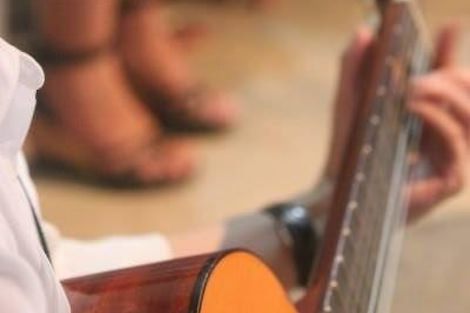 As a musician, I like music in the Catholic liturgy. I prefer weekend mass to have music rather than not. Music moves me in sometimes profound ways.
As a musician, I like music in the Catholic liturgy. I prefer weekend mass to have music rather than not. Music moves me in sometimes profound ways.
It's good to be a little eclectic too, because as Catholics, there is a wide variety which is accepted and played in parishes around the world. World Youth Days tend to be a showcase of this diversity, with a wider range of styles played, even within the one liturgy or mass.
Australia as a country is no exception to this wide variety of music in parishes.
Those of us who attend parishes frequently have probably experienced the plethora of options ranging from the 85-year old playing the organ with traditional repertoire; the majestic Cathedral choir; or folky choirs complete with guitars, cymbals, triangles and tambourines.
Then there are the young adult choirs which can be a mixed bag. Some of us are more liturgically conservative than our parents’ generation, so we might mix it up a bit by playing from the "green book", but then maybe might use something a little more charismatic or suited to praise and worship. A popular emergence recently has been the music of artists like Matt Maher, Fr Rob Galea and Audrey Assad who blend traditional Catholic beliefs with a modern style of music.
Having reflected deeply on these questions and humbly aware that I haven't always gotten the song choices right, the question was recently posed to me:
What happens when, regardless of the style of music, it is just not played well?
When it is well played and reflective of the moment it accompanies, music can be, as Saint Augustine said, like a prayer prayed twice (when we sing, we pray twice.)??Many of us have perhaps experienced that moment in parishes where the loud, badly played, out-of-tune music starts up after communion, just as we settle down to pray, and rather than helping, it can hinder the moment.
I was discussing this recently with a parish priest who has just become the head pastor at a large, amalgamated parish. We talked about music in the parish. He shared with me that the balance is so crucially important as to make the difference for people between what parish they attend, and what parish they avoid.??Catholic artist Audrey Assad expresses this beautifully in her song "You Speak". She sings: “In the silence of my heart, you speak, you speak”. She repeats this phrase again and again like a chant.??While her song is a musical expression of the idea of silence, its gentle flow and mantra-like quality explains an important concept. That is, the need to slow down and listen for the voice of God.
Music ministries too need to do this.
We need to ask why we do what we do.
If the purpose of liturgical music is to lead others into prayer, what happens when it does the opposite?
What happens when music ministry is no longer an activity which draws communities together and includes people, but rather a chance for people to shine, or transversely, not shine but frustrate and hinder the congregation?
It's a tough one and I feel for the parish priests who are faced with the task of sensitively informing those who don't perhaps "add" to the liturgy that perhaps they might discern another charism.
Personally, I've struggled with this over many years.
We need to ask ourselves about our Christ-like values of inclusion, but also, the importance of beauty in the liturgy.
The most important thing is balancing the prayer life of the parish with the needs of people who seek to be included in the music ministry, even if, as they say, they don't sing from the same song sheet.
Perhaps this reflection doesn’t answer any questions; more likely, it has added to them.
One prayer might be that in whatever music there is to accompany the liturgy, it has been given as a gift. Even if it doesn’t necessarily lead us into a deep encounter with God, the intention and the gift is still there.
Beth Doherty is editor of www.pray.com.au and a church musician